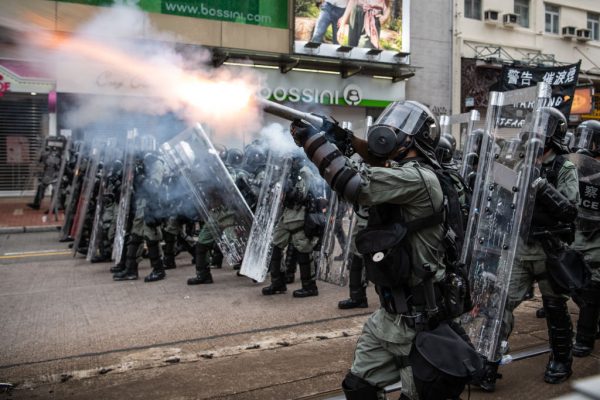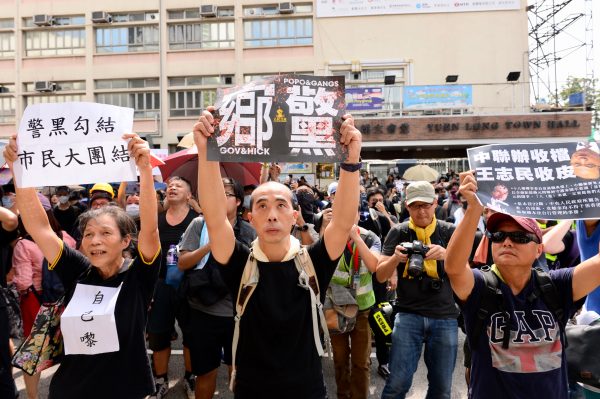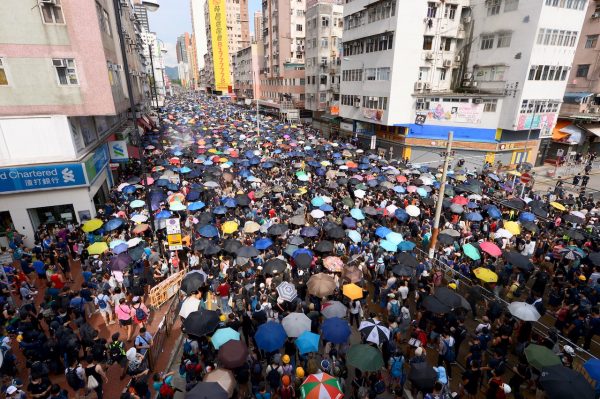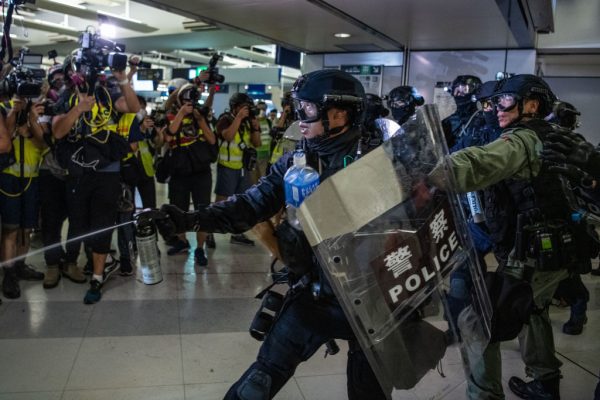By David Crawshaw and Timothy McLaughlin

Riot police move to disperse protesters outside a police station in Hong Kong early Monday.
HONG KONG — The “yellow object” lying on the ground had a distinct shape, evident in the video footage that surfaced later.
Certainly, a good portion of it was bright yellow.
It appeared to have arms.
And two protrusions that resembled legs.
Someone had dressed the object in dark-colored shorts.
As Hong Kong police officers swarmed over the object and roughed it up in a dark alley, it appeared to squirm.
In a city grown accustomed to clashes between demonstrators and police as the government responds to months of protests with tear gas and mass arrests, the incident on Saturday and the official response to it illustrated a breakdown in the relationship between the police force and the public.

Galileo Cheng@galileocheng
A high definition, in focus video showing the malpractice by the police, shot by Yuen Long resident Ben, obtained for @HKFrontline - Acting Senior SP (Ops)(NTN HQ) Vasco Williams, that is not an ‘yellow object’ #antiELAB #ExtraditionLaw #HongKongProtests
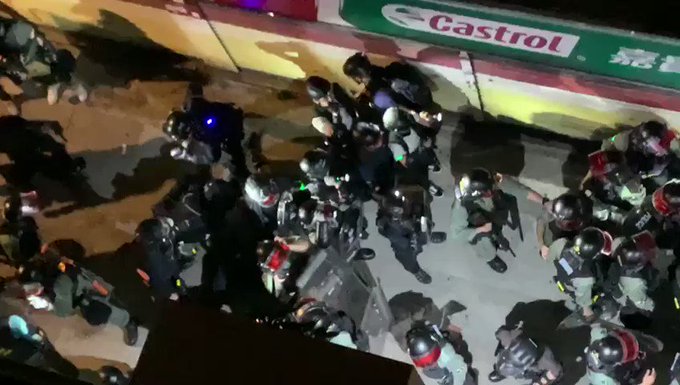
The episode underlined a harsh reality in this global financial hub, once admired for its legal system and official transparency.
As Hong Kong police officers swarmed over the object and roughed it up in a dark alley, it appeared to squirm.
In a city grown accustomed to clashes between demonstrators and police as the government responds to months of protests with tear gas and mass arrests, the incident on Saturday and the official response to it illustrated a breakdown in the relationship between the police force and the public.

Galileo Cheng@galileocheng
A high definition, in focus video showing the malpractice by the police, shot by Yuen Long resident Ben, obtained for @HKFrontline - Acting Senior SP (Ops)(NTN HQ) Vasco Williams, that is not an ‘yellow object’ #antiELAB #ExtraditionLaw #HongKongProtests

The episode underlined a harsh reality in this global financial hub, once admired for its legal system and official transparency.
With Beijing asserting increasing control over the city’s institutions and Hong Kong’s leader refusing to allow an independent inquiry into police behavior, authorities here appear not to fear the consequences of violating protocols intended to uphold the rule of law.
Instead, their approach this week was to obfuscate.
Asked Monday about the incident in Yuen Long, an outlying area of Hong Kong, acting senior superintendent Vasco Williams said footage showed an “officer kicking a yellow object,” not a man lying on the ground.
“We don’t know what that object is, but there are other videos that are more clear that show the entire incident,” he said.
Instead, their approach this week was to obfuscate.
Asked Monday about the incident in Yuen Long, an outlying area of Hong Kong, acting senior superintendent Vasco Williams said footage showed an “officer kicking a yellow object,” not a man lying on the ground.
“We don’t know what that object is, but there are other videos that are more clear that show the entire incident,” he said.
“And there’s no malpractice by the police whatsoever.”
There was no assault, he added during a heated news conference.
The man shown in the video being kicked by police was a member of a group that deploys volunteers to negotiate between police and protesters at rallies, the group said.
The man shown in the video being kicked by police was a member of a group that deploys volunteers to negotiate between police and protesters at rallies, the group said.
He was later arrested, local media reported.

Riot police stand guard behind a burning barricade after a protest march in Tuen Mun, Hong Kong, on Saturday.
Williams conceded that the case warranted investigation but suggested that the video could have been “doctored” — an idea that was quickly debunked.
“Knowing you are being videoed, do you think any officer would be that stupid to assault someone under detention? I don’t think so,” Williams said.

Riot police stand guard behind a burning barricade after a protest march in Tuen Mun, Hong Kong, on Saturday.
Williams conceded that the case warranted investigation but suggested that the video could have been “doctored” — an idea that was quickly debunked.
“Knowing you are being videoed, do you think any officer would be that stupid to assault someone under detention? I don’t think so,” Williams said.
Hong Kong’s daily police briefings are carried by numerous news outlets and watched by thousands. Nearly as soon as Williams spoke, netizens pointed out that more than a month ago, two officers were arrested after being captured on security footage beating a 62-year-old man restrained in a hospital bed.
Shortly after the news conference, posts that appeared to be from Williams’s account on the job networking site LinkedIn were revealed, drawing even more negative attention to the police from those supporting the pro-democracy movement.
The account, which used the name Vasco W. and listed “Superintendent at the Hong Kong Police Force” as the job description, included derogatory comments about protesters, pro-democracy lawmakers and Hong Kong residents in recent months.
Shortly after the news conference, posts that appeared to be from Williams’s account on the job networking site LinkedIn were revealed, drawing even more negative attention to the police from those supporting the pro-democracy movement.
The account, which used the name Vasco W. and listed “Superintendent at the Hong Kong Police Force” as the job description, included derogatory comments about protesters, pro-democracy lawmakers and Hong Kong residents in recent months.
Images of the posts were taken by The Washington Post before the account appeared to be deactivated.
Throughout the protests that have rocked the city, triggered by a now-shelved plan to allow extraditions to mainland China, Hong Kong Chief Executive Carrie Lam has refused to countenance an independent investigation into police tactics — one of protesters’ five demands.
Those tactics have become more forceful over recent weeks, with police making more than 1,550 arrests and deploying water cannons and stinging blue dye along with tear gas.
A report last week by Amnesty International accused the force of “reckless and indiscriminate” tactics, including torture, beatings and other mistreatment of detained protesters.
Those tactics have become more forceful over recent weeks, with police making more than 1,550 arrests and deploying water cannons and stinging blue dye along with tear gas.
A report last week by Amnesty International accused the force of “reckless and indiscriminate” tactics, including torture, beatings and other mistreatment of detained protesters.
The report followed criticism of the police by the United Nations.
Asked Tuesday how her government could rebuild trust in the police without a fully independent investigation, Lam said her backing of the force does not mean she “condones irregularities.”
Asked Tuesday how her government could rebuild trust in the police without a fully independent investigation, Lam said her backing of the force does not mean she “condones irregularities.”
Lam has said the existing police watchdog has her “full support” to conduct fact-finding studies, but critics note that the body is headed by an official she handpicked, is packed with her associates and loyalists and is not authorized to call witnesses.
Pressed about the video of the “yellow object,” Lam said it would be difficult to opine on “what is right, what is wrong, what is true, what is fake, because there have been . . . different versions [of] the same incident.”
The police have been under extreme pressure, she said, adding it was “quite remarkable” that there have been no fatalities.
Pressed about the video of the “yellow object,” Lam said it would be difficult to opine on “what is right, what is wrong, what is true, what is fake, because there have been . . . different versions [of] the same incident.”
The police have been under extreme pressure, she said, adding it was “quite remarkable” that there have been no fatalities.
The protests represent a challenge to the authority of Chinese dictator Xi Jinping, who warned in 2017 that any effort to contest China’s sovereignty over Hong Kong was a “red line.”
Although not an independence movement, the protests have come as Xi faces pressure on numerous fronts, including China’s trade dispute with the United States, a slowing economy, rising food prices, a recalcitrant Taiwanese administration and accusations of cultural genocide against the Uighur people and other Muslim minorities in China’s East Turkestan colony.
Chinese authorities appear particularly anxious for calm ahead of Oct. 1, the 70th anniversary of the founding of Communist China.
Chinese authorities appear particularly anxious for calm ahead of Oct. 1, the 70th anniversary of the founding of Communist China.
Protesters are planning to disrupt official events in Hong Kong, where the government has already canceled a fireworks show.
On Tuesday in Hong Kong, a pro-democracy lawmaker, Roy Kwong, was attacked by three masked men as he tried to get into his car.
On Tuesday in Hong Kong, a pro-democracy lawmaker, Roy Kwong, was attacked by three masked men as he tried to get into his car.
The trio kicked and punched Kwong and recorded the assault on video, according to other lawmakers from the democracy camp.
“The fact the attackers recorded the ambush leads me to believe that the attackers were paid to do this and the video would be needed as proof in order to get paid,” said James To, a pro-democracy lawmaker.
“The fact the attackers recorded the ambush leads me to believe that the attackers were paid to do this and the video would be needed as proof in order to get paid,” said James To, a pro-democracy lawmaker.
“By beating him, it is sending quite an alarming signal that Hong Kong is a place without regard for rule of law.”
